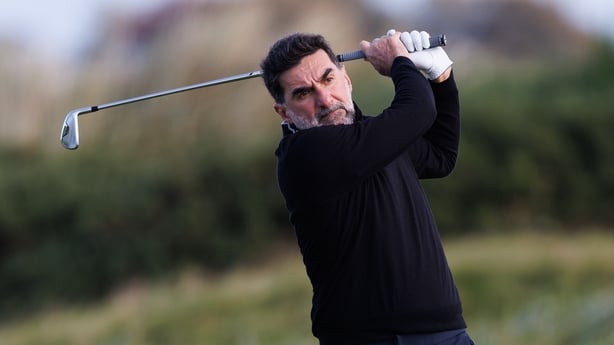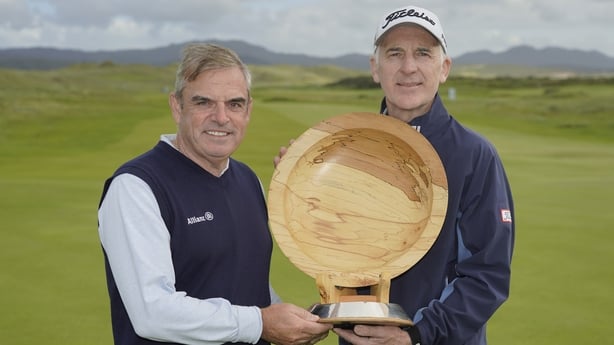Despite talk of thawing relations and a reportedly "constructive" meeting in the Bahamas, Paul McGinley believes that a deal between the PGA Tour and the Saudi-funded LIV tour could be years away.
And the former Ryder Cup winning captain fears the protracted civil war in golf is doing enormous harm to the sport in the eyes of the public. A verdict which he notes is supported by declining viewing figures, down 20% on last year.
Almost nine months after the world's best players last congregated together at Hoylake, they'll finally compete against each other again at Augusta National in early April.
This month's Players Championship, long celebrated as the 'fifth major', proceeded without Jon Rahm, Brooks Koepka, Bryson DeChambeau, et al.
The shock defection of Rahm to the LIV stable last December was supposed to have prompted a renewed push for an agreement between the factions, particularly from the PGA side.
However, in the wake of the PGA Tour securing $3 billion from a private equity consortium of US sports owners (including Fenway Sports Group) in January, McGinley reckons the appetite for compromise is not there among the Tour membership.
Speaking to RTÉ Sport's Greg Allen on Radio 1's Saturday Sport, McGinley says there's still a wide gulf between the two sides and golf will continue to suffer.
"Don't hold your breath," he replies, when asked if a deal is on the horizon. "I think both parties are still wide away from each other in terms of where the common ground is.
"It's (the Masters) the first time since the Open that we're going to see all the best players in the world back together again in terms of playing an event.
"Obviously, it's a divided and diluted product at the moment.
"When Jon Rahm went, everybody said 'oh, there has to be a deal now, he's No.2 player in the world'. And here we are, four months down the road from Jon going, and really, there's no sign of a deal.
"There's a lot of resolve on the PGA Tour side to say, 'we're OK, we've got this investment in from the Strategic Sports Group, let's batten down the hatches and go'.
"And LIV are the same: 'If you're doing that, well we'll batten down the hatches too and we'll go.
"And I'm in the middle thinking, 'well that's not going to be good for golf.' I hope that doesn't happen. But we could have to be resigned to that.
"It could be a few more years before we see any kind of daylight, unfortunately. And I don't think golf is going to thrive in that period of time."
"It's unbelievable. Everything seems to be coming down to money. I think the public are fed up with that. It's the rich getting richer.
In the Bahamas this month, the player-directors of the PGA Tour - a grouping which includes Tiger Woods - finally met with Saudi Arabia's PiF governor Yasir Al-Rumayyan.
It was reported that Woods played nine holes with the PiF chief at Albany Golf Club. (The meeting had originally been to take place in Florida but was moved to the Bahamas, where, as AP's Doug Ferguson noted pithily, "Woods often keeps his yacht.")
The other player-directors are Patrick Cantlay, Jordan Spieth, Adam Scott, Webb Simpson and Peter Malnati. Rory McIlroy, a very vocal director in recent years, stepped down from the board last November and was replaced by Spieth, the latter now being reportedly more resistant to a deal with the Saudis.

While Woods is a revered grandee and elder statesman on tour, McGinley points to an important dynamic often missed. Namely, that the PGA Tour is a democratic members organisation.
Last June's shock announcement of a commercial partnership between the PGA Tour and the Saudi wealth fund was done without consultation with the PGA members, leaving many feeling blindsided and furious.
"Remember, what makes this so difficult is the PGA Tour is a members' organisation," says McGinley.
"It's one man, one vote. Although the likes of Rory McIlroy and Jordan Spieth and Tiger Woods will have a little more influence because of who they are, ultimately it is a democratic members organisation.
"Trying to get a consensus to move forward is incredibly difficult. And mistakes have been made in the past in terms of governance, and decisions made where all the players were not briefed on. They've reacted very, very negatively to that happening. They've ensured it won't happen again.
"It's like trying to move a big super-tanker. It's very slow moving, trying to get everybody aligned. It's not a case of Jay Monahan and Tiger Woods just deciding 'okay, let's do a deal' and go ahead without bringing everybody with them.
"On the other side, Yasir is the one guy who's the head of the PiF fund and is running LIV and has funded it to several billion dollars so far - he can make a decision in the morning on where he wants to go.
"So, it's two very different dynamics at play here."
There are a divergence of views between some of the Tour's leading lights. McIlroy, initially scathing about LIV, is now touting compromise and sounding an emollient note.
In contrast, a number of the American players, Spieth and Justin Thomas among them, are instinctively more hostile and content with the PGA Tour status quo.
McGinley sides with McIlroy, who he credits with taking a broader view.
"Rory would have a much more globalistic view on the game than the American-based players like Jordan would. That's why there's a difference of opinion there.
"A lot of the American players have a view that, 'look, we're doing OK on the PGA Tour, we don't need the LIV players, let's close down the hatches and move forward.'
"Whereas players like Rory would be of the view - and I must say I'd be similar - that, wait a minute, our TV figures are down 20% every single week this year.
"As a diluted product, golf is not flourishing. And golf, as a business, will continue to not flourish. We need to look at a more global way of increasing the value of the business model that PGA Tour golf is. That'd be his view."

While the golfing diplomatic 'summit' in Bahamas is an "opening gambit" and a welcome one, McGinley is concerned that both sides have become more entrenched behind their battlements since last summer.
The PGA Tour retains a lucrative TV deal, with the top players now holding equity in the business, while the Saudis can continue sustaining a loss-making enterprise for several more years yet.
All the while, viewing figures are in decline, the public are growing weary as the sport continues to cannibalise itself. When the PGA Tour goes to renew its TV deal in 2029, will it be as lucrative, wonders McGinley.
"It's unbelievable. Everything seems to be coming down to money. I think the public are fed up with that. It's the rich getting richer.
"It's professional golf - which wasn't poor anyway - and people are losing their minds because of money. Making decisions based on money. And the game is being lost.
"I think there's a lot of public apathy towards the game. That's why viewing figures are down as much as they are. And that's why LIV has also not ignited.
"Golf has got to be very, very careful here that the public will get fed up at the end of the day.
"The ultimate big player here is Joe Public. Because they will determine whether golf will be successful or not.
"Both of those sides, the PGA Tour and LIV, will follow what the public wants. And follow what corporate wants.
"That's why it's important they find some sort of common ground and golf gets back on the rails a bit more.
"Because at the moment in golf, all we're seeing is the four major championships. They're the only events where the top players come together."
Paul McGinley was speaking to RTÉ as an ambassador of the OFX Irish Legends Golf event at Seapoint, Co. Louth (19-22 June)
